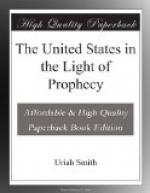Such a work as this, then, the papacy must accomplish according to the prophecy; and the prophecy cannot fail. And when this is done, what do the people of the world have? They have two laws demanding from them obedience: one, the law of God as originally enacted by him, an embodiment of his will, and expressing his claims upon his creatures; the other, a revised edition of that law, emanating from the pope of Rome, and expressing his will. And how is it to be determined which of these powers the people honor and worship? It is determined by the law which they keep. If they keep the law of God as given by him, they worship and obey God. If they keep the law as changed by the papacy, they worship that power. But further, the prophecy does not say that the little horn should set aside the law of God and give one entirely different. This would not be to change the law, but simply to give a new one. He was only to attempt a change, so that the law as it comes from God, and the law as it comes from the hands of the papacy, are precisely alike, excepting the change which the papacy has made therein. They have many points in common. But none of the precepts which they contain in common can distinguish a person as the worshiper of either power in preference to the other. If God’s law says, “Thou shalt not kill,” and the law as given by the papacy says the same, no one can tell by a person’s observance of that precept whether he designed to obey God rather than the pope, or the pope rather than God. But when a precept that has been changed is the subject of action, then whoever observes that precept as originally given by God is thereby distinguished as a worshiper of God; and he who keeps it as changed, is thereby marked as a follower of the power that made the change. In no other way can the two classes of worshipers be distinguished. From this conclusion, no candid mind can dissent; but in this conclusion we have a general answer to the question before us, “What constitutes the mark of the beast?” THE MARK OF THE BEAST is THE CHANGE HE HAS MADE IN THE LAW OF GOD.




